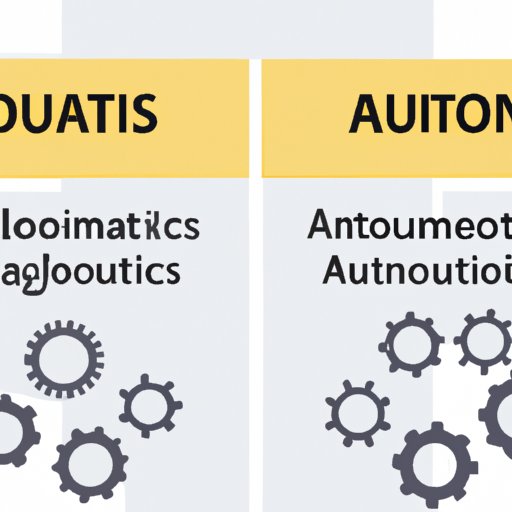Introduction
Automation is a process that involves using technology, such as computers and robots, to perform tasks that were previously done by humans. The goal of automation is to increase productivity, reduce costs, and improve quality. Automation is used in many industries, including manufacturing, logistics, healthcare, finance, and retail.
The use of automation has had a profound impact on businesses around the world. It allows companies to streamline processes and increase efficiency, which leads to higher profits. Automation also reduces the need for manual labor, which can result in cost savings and improved customer service.
Exploring the Impact of Automation on Businesses
Automating processes is one way that businesses can benefit from automation. By automating processes, businesses can save time and money, improve accuracy, and reduce errors. Automation can be used to automate routine tasks, such as data entry, order processing, and customer service.
However, there are some drawbacks to automating processes. Automation can lead to job losses, as machines take over jobs previously done by humans. Additionally, automation can be expensive to implement and maintain. It is important for businesses to weigh the pros and cons of automation before making any decisions.

Automation in Manufacturing: A Comprehensive Guide
Automation has revolutionized the manufacturing industry. Automation has allowed manufacturers to produce goods more quickly, efficiently, and accurately than ever before. Automation has also enabled manufacturers to reduce costs and increase profits. Automation has been used to streamline production processes, reduce human error, increase safety, and improve quality control.
Automation in the manufacturing industry has come a long way in recent years. Many large manufacturers now use robots to help with tasks such as welding, painting, and packaging. Automation has also led to the development of new technologies, such as 3D printing and artificial intelligence.

The Benefits of Automation for Small Businesses
Small businesses can also benefit from automation. Automation technology can help small businesses streamline processes, reduce costs, and improve customer service. Automation can also help small businesses keep up with larger competitors by allowing them to compete on the same level.
Automation technology can include software programs, robotic process automation (RPA), and machine learning. Software programs can automate mundane tasks such as data entry and order processing. RPA can automate complex tasks such as customer service and inventory management. Machine learning can be used to automate tasks such as analyzing customer data and predicting customer behavior.

Automation in the Workplace: Its Advantages and Disadvantages
Automation in the workplace has both advantages and disadvantages. On the plus side, automation can increase productivity, reduce costs, and improve quality. Automation can also reduce the need for manual labor, which can result in cost savings and improved customer service. Additionally, automation can help reduce errors and increase safety.
On the other hand, automation can lead to job losses and decreased job satisfaction. Automation can also be expensive to implement and maintain. Finally, automation can lead to a lack of flexibility and creativity in the workplace.
Conclusion
In conclusion, automation has had a profound impact on businesses around the world. Automation can help businesses streamline processes, reduce costs, and improve customer service. Automation has also enabled manufacturers to reduce costs and increase profits. Small businesses can also benefit from automation technology, such as software programs, robotic process automation, and machine learning.
However, automation can also lead to job losses, decreased job satisfaction, and a lack of flexibility and creativity in the workplace. It is important for businesses to weigh the pros and cons of automation before making any decisions.
Summary of Automation’s Impact on Businesses
Automation has had a significant impact on businesses around the world. Automation can help businesses streamline processes, reduce costs, and improve customer service. Automation has also enabled manufacturers to reduce costs and increase profits. However, automation can also lead to job losses, decreased job satisfaction, and a lack of flexibility and creativity in the workplace.
Final Thoughts on Automation
Automation is an important tool for businesses of all sizes. It can help businesses streamline processes, reduce costs, and improve customer service. However, it is important for businesses to weigh the pros and cons before making any decisions about automation.
(Note: Is this article not meeting your expectations? Do you have knowledge or insights to share? Unlock new opportunities and expand your reach by joining our authors team. Click Registration to join us and share your expertise with our readers.)
